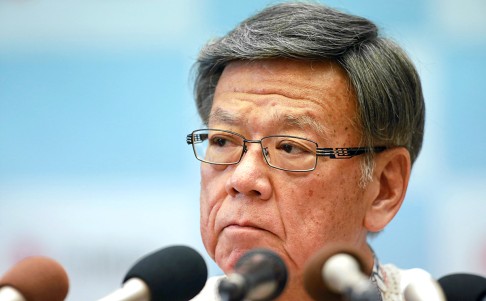
Okinawa governor revokes approval for relocation of controversial US air base, but Tokyo insists plan will go ahead
The stalemate over the relocation plan is now likely to end up in court

Okinawa's governor has revoked approval for work needed to relocate a US air base from one area of the southern Japanese island to another, but the Tokyo government said it would still proceed with the plan.
Local residents object to living with US Marine Air Station Futenma and want the base moved off Okinawa. Current plans call for moving it to a less developed area on the island called Henoko.
Governor Takeshi Onaga was elected last year on promises to fight the move, revoked the local approval given in 2013 by his predecessor on the grounds of “legal defects.”
“I will work to keep my promise not to allow another base in Henoko,” Onaga said.
Government spokesman Yoshihide Suga rejected Onaga's stance, saying the base must be moved for safety reasons.
“There is no change in our plan to proceed with the work,” Suga said in Tokyo. He called Onaga's decision “very regrettable.”
The central government suspended the land reclamation work on August 10 to allow for a month of talks to reach a compromise with the Okinawan government, but that proved to be too short of a period to resolve two decades of political fighting, and the reclamation work resumed last month despite strong protests by local residents and activists at the site.
The defence minister, Gen Nakatani, said work on the site would be suspended, but that it would restart as soon as possible. He planned to request an investigation and seek a court injunction to overturn Onaga's revocation.
Okinawa houses more than half of the 50,000 US troops stationed in Japan and US bases occupy nearly a fifth of the land on its main island. But the local government says the bases are a drain on the economy, providing less than 5 percent of its business activity and employing only 1.4 percent of its workers.
A leaflet issued by the Okinawa government shows significant gains in the local economy from areas already redeveloped once land was returned by the US military.
But safety concerns appear to be the main factor behind plans to move Futenma's airfield, which is surrounded by a largely residential area, including schools and hospitals.
The US side says it is committed to the base relocation and views it as important to the health of the US-Japan security alliance.
The dispute over relocating Futenma symbolises centuries-old tensions between Okinawa and the Japanese mainland, which annexed the islands, formerly the independent kingdom of the Ryukyus, in 1879. In the final days of the second world war, Okinawa became Japan's only home battleground, and the island remained under U.S. rule for 20 years longer than Japan's 1952 emergence from the American occupation.